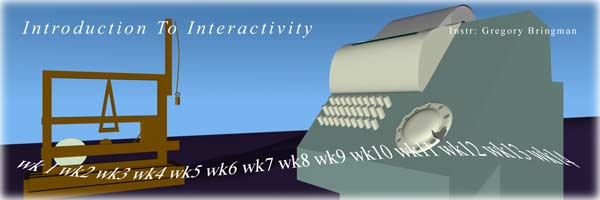Russian Constructivism:
The Case of Vertov's Man With A Movie Camera
At the end of the silent cinematic era, Dziga Vertov produced
Man with a Movie Camera, a cinematic art form that was
a utopian expression of visual symbol-making. Vertov was dealing
with the
new science of signs or semiotics, which is a science that widens
the scope of language metaphors to images.
For this list, I have taken elements from vertov's film that
can be evaluated, much like watching the film itself, for the "play"
between signs.
"The signs of Vertov's Man with a Movie
Camera"
A Theater
The seats are let down
The orchestra pauses before the film begins
The projector starts.
Self-Referentiality in Vertov
The cameraman awakes
He drives to the train tracks
His film of the train coming forward is the dream of a "girl awakening"
A constructivist poster depicts two figures
with finger raised to their mouths to keep quiet, before she
awakes. Her dream is
a nightmare, for the cameraman is in trouble, he is on the
tracks of an oncoming train.
She wakes as the cameraman dodges the locomotive at the last minute.
Association in Vertov.
The girl arises and begins to get ready for a
day on the town.
She bathes; City workers "bathe" the dirty streets
with a stream of water from a hose.
Association in Vertov.
The Marketplace
The crowd
The tall architecture.
Meanwhile the cameraman films the window displays.
A sewing machine.
Important in Russian constructivism: the sewing
machine on the operating table.
A mannequin on a bicycle.
The ambulance transports a man with a head injury.
They attempt to stop the bleeding.
The cameraman films a horse carriage with passengers
In truth another cameraman that we do not see
films the cameraman filming the carriage
All of the sudden, the marketplace crowds stops.
Filmmakers have control over time.
Vertov's wife is at the editing table.
She isolates a single film frame, corresponding
to the film, as we see it, stopping on this frame.
A peasant woman freezes--not shaking, but as if
time has stopped.
She occupies the film frame on the editing table.
Vertov's wife spins the film spools; the action
begins again...
The socialist state is busy.
Leninist Russia blossoms.
Art attempts to change culture and society.
Art is utopian, but utopian is triggered through
social problems
The divorce rate
The marriage rate
Opposites.
Opposite Directions.
The voyeur gazes through a site-seeing apparatus
on a rooftop.
The wind blows; the apparatus swivels.
The couples featured change from one getting married
to one getting a divorce.
Both must simply fill out paperwork.
The age of association and Montage
The age of composite photography.
Film as a Universal Language
Language as Universal Communication
Communication as Media
Medium as Message and Universal Language.
The film is full; It deserves a few viewings.
return to From the List to the Semantic Web
|

